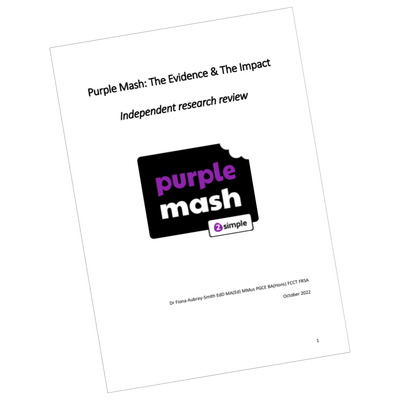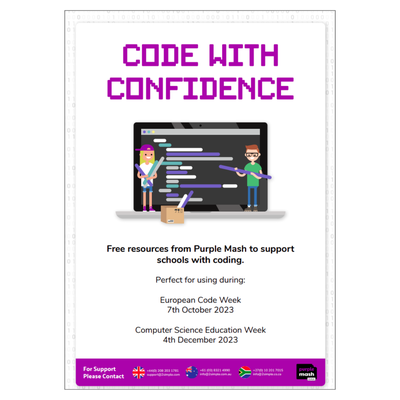Oct. 25, 2023
The National Curriculum set out its purpose of study for Key Stages 1 and 2 as:
“A high-quality computing education equips pupils to use computational thinking and creativity to understand and change the world.”
The rationale behind teaching coding to primary pupils is grounded in the belief that early exposure to coding empowers students with problem-solving abilities, nurtures their creativity and fosters a deep understanding of technology.
However, nearly 10 years after the introduction of coding as one of the three main strands within the curriculum are teachers and pupils really coding with confidence?
Last year, 2Simple commissioned an independent research review led by Dr. Fiona Aubrey Smith to investigate the extent to which Purple Mash is meeting the needs of learners and teachers. We have highlighted below the way that Purple Mash has led to increased confidence in coding for both teachers and pupils.
One of the key features of Purple Mash is its distinctive Computing Scheme of Work. The Purple Mash Computing Scheme of Work addresses each of the three strands of the National Curriculum for Computing: Computer Science, Information Technology and Digital Literacy.

The Scheme of Work takes a spiral approach to learning and provides over 50 highly-integrated units which are intended to introduce, build and deepen knowledge for all children. Teachers are provided with fully planned and resourced units of work which utilise information technology as part of every discrete computing lesson.
In their 2022 report, Ofsted reported that high-quality computing education should be, ‘…rich in computer science knowledge, enabling children to make sense of the entire computing curriculum’ and that ‘children learn important programming knowledge to enable them to become skillful programmers.’
This was illustrated by 2Simple as follows; “There is a coding unit in each year that uses 2Code block coding to develop skills and knowledge of the design, code, refinement process of programming and a variety of other computer science units. These range from the beginning of algorithmic thinking in year 1, to introducing the Logo language in the form of 2Go and then 2Logo in year 4. Children develop their computer science knowledge and skills through game creation and learning about binary in year 6. The programming units are carefully structured to support children in completing a mental model for good programming that they can apply to future challenges.”
The role of 2Code activities within Purple Mash and the support structures in place for teachers to stretch children’s coding skills were a notable theme through the data analysis of interviews with teachers, computing specialists and school leaders. Furthermore, many spoke about the ways in which children’s coding skills learned through 2Code were then transferrable across other contexts.
We have put together a FREE pack to support teachers to code with confidence this includes:
“Over 2 years on the computing curriculum, we've seen that key stage two coding is actually challenging children much more on Purple Mash than in Scratch Junior.” Computing Lead

Where children attend schools who use Purple Mash, there is an awareness of coding from a very early age which appears to be directly attributable to activities within Purple Mash itself. For example, in a survey of early years and key stage one children, administered by their normal classroom teachers, 69% of children in nursery and reception knew what coding was and reported having completed some coding activities.
When asked about age-appropriate coding activities that they had undertaken through 2Code in Purple Mash, 85% of children surveyed said that they thought coding was either easy or very easy. A notable detail within this finding was that as children moved through key stage two (years 3-6), fewer children reported finding coding easy – suggesting that the level of challenge provided to children was perceived by those children to increase with age. Of the teachers and leaders who were surveyed about the Purple Mash Computing Scheme of Work, 76% said that Purple Mash increases children’s engagement and enjoyment of computing.